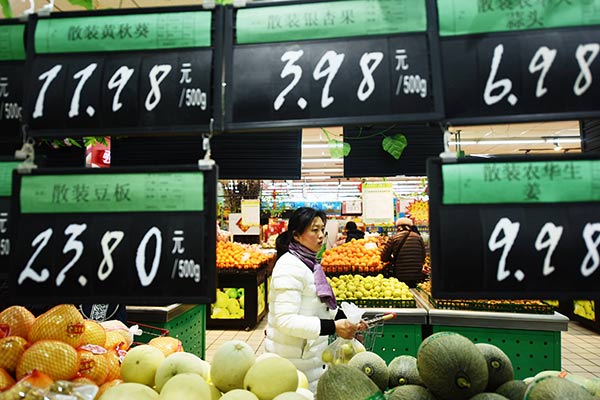Consumer inflation slows


Lower food prices help sustain momentum as factory-gate prices rise 4.3%
China's consumer inflation is set to strengthen this month after slowing in January, but will not be a cause for concern for the rest of the year as it will remain largely stable at low levels, analysts said on Friday.
The expectation of steady inflation is in stark contrast to the rising inflation concerns in the developed markets, which had triggered stock slumps recently in the US and Japan.
The Consumer Price Index rose 1.5 percent year-on-year in January, down from 1.8 percent in December, the National Bureau of Statistics said. Falling food prices helped the CPI easing last month, Sheng Guoqing, a statistician of the NBS, said in a statement.
Base effect is the main factor behind the falling CPI, said Lian Ping and Tang Jianwei, analysts with the Bank of Communications, in a research note.
Last year, during the traditional Spring Festival, which generally jazzes up consumption and transportation activities, the CPI fell in January. The festival is in the middle of this month this year.
Since CPI was only 0.8 percent last February, the lowest in 2017, the index may see a surge this month given the base effect, and possibly exceed 2 percent, said Lian and Tang. "But it does not indicate that the whole-year reading would be high; the February reading could become the height of the year."
Hu Yuexiao, an analyst with Shanghai Securities, said China's CPI in February could be 1.9 percent for seasonal reasons, referring to the effect of Spring Festival. "The trend will remain a downside cycle," he said.
Considering that China has vowed to continue to cut leverage levels in the financial sector and the real economy, liquidity will remain quite tight and economic growth may ease, therefore ruling out the possibility of strong rises in consumer inflation, said Lian and Tang.
"It is expected to be about 2 percent for the whole of this year, significantly higher than last year's 1.6 percent, but there would not be significant consumer inflation pressure (on China)," they said.
International oil prices have moved down since this month, which will also reduce the country's consumer inflation pressure since it is a major oil importer, said Yan Ling, an analyst with China Merchants Securities.
Due to the high base effect, Producer Price Index (PPI), a gauge of factory-gate prices, rose by 4.3 percent year-on-year in January, down from 4.9 percent in December and marking the third straight monthly easing, the NBS said. It was 6.9 percent last January, the third-highest in 2017.
Analysts said PPI growth will remain largely stable this year but will be lower than last year on average.
"As China continues to cut excessive production capacity and strengthen environmental protection moves, prices of products in sectors as steel and cement will not fall significantly in the short term, therefore buttressing the PPI growth," said Lian and Tang, forecasting the whole-year growth may be around 3.5 percent, compared with 6.3 percent in 2017.




































